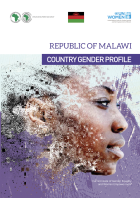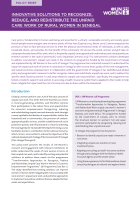1 - 11 of 11 Results
Date:
The ultimate goal is that women and girls in Sudan benefit from gender-responsive humanitarian action and targeted assistance that responds to their basic needs, and from opportunities for their meaningful participation in peace, political and humanitarian processes.
Date:
The Malawi Counrty Gender Profile publication presents a review of existing gender issues identified through a review of documents and reports recently released. The generic purpose of Country Gender Profile is to strengthen national understanding and data on the advancement of international, regional and national commitments towards Gender Equality and Women's Empowerment.
Date:
This policy note presents the results of the assessment of the needs of rural women, carried out as part of the 3R Programme in Senegal, and namely the unpaid-care work related needs faced by rural women, along with the innovative solutions and policy measures needed to address these needs and recognize, reduce, and redistribute rural women's unpaid care work.
Date:
This edition of our quarterly publication, aimed at keeping our esteemed readers abreast with the endeavors of UN Women Uganda, encompasses the period of October through December 2022. Within these pages, we have meticulously curated a selection of activities undertaken by our organization, as well as providing a platform for the voices of those whom we have had the privilege of serving, to be heard. We trust that the contents of this newsletter will prove to be both enlightening and informative. Enjoy the read!
Date:
Devolution has increased opportunities for women and other marginalized groups to participate and engage in county-level planning, budgeting, and implementation, and ensured an opportunity for county governments to integrate gender-responsive mechanisms in these same processes. The report synthesizes the impact on women and girls in devolved sectors of local government including education, health, agriculture, water and sanitation, and urban planning across the 14 counties of the United Nations Joint Devolution Programme.
Date:
6 key recommendations for a gender-responsive social protection regime in Senegal
Date:
This publication highlights findings from the Zanzibar SDGs Gender Indicators Study in the form of infographics. The infographics showcase findings from each of the sectors covered in the report namely: Poverty and Hunger, Health, Decent Work, Quality Education, Gender Equality, Key Messages and the COVID-19 Context, and Recommendations.
Date:
Hygiene and sanitation are development issues that have long been overlooked by governments. However, as a result of sustained advocacy efforts, they are at the very top of the global and national agenda today. Senegal has a fairly progressive national strategy that aims to improve gender parity in political representation, healthcare and education, access to drinking water and sanitation facilities and maternal and infant mortality among other priorities.
Date:
This edition addresses the Health issues of Women in Malawi and Senegal, Education in Burkina Faso and in Africa, Peace and Security in Cameroon and at African Union, Women in Agriculture in Mozambique and Ethiopia and Women Economque Empowerment across Africa.
Date:
Guided by the Continental Policy Framework on Sexual and Reproductive Health and Rights and its Maputo Plan of Action, African countries have made significant strides in the fight to reduce preventable maternal and child deaths over the past decade. Despite commendable achievements, challenges still continue to hinder progress at the required rates of change. Africa remains a highly risky region for women to become pregnant and give birth; women in Africa, still face a 1 in 39 lifetime risk of...
Date:
Hygiene and sanitation are development issues that have long been overlooked by governments. However, as a result of sustained advocacy efforts, they are at the very top of the global and national agenda today. Senegal has a fairly progressive national strategy that aims to improve gender parity in political representation, healthcare and education, access to drinking water and sanitation facilities and maternal and infant mortality among other priorities.










